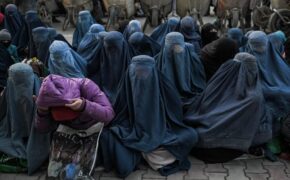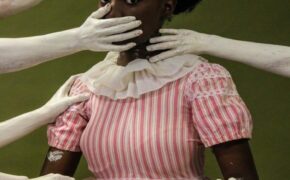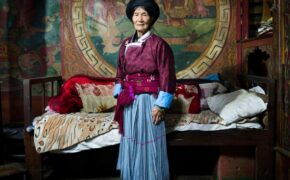A Tale of Stolen Generations: A Baby Taken in the First Hours
The room was still warm with the shock of birth when they came for her child. Exactly two hours old, barely awake, not even yet fed. The mother Keira, an Inuit woman from Greenland living in Denmark had only just held her daughter for the first time when the door opened again, this time not with nurses but with social workers. They lifted the infant from her chest and walked out without ceremony, without tenderness, without explanation that made any human sense.
Her crime? Not abuse. Not neglect. Not addiction or violence. Her crime was failing a test. A test rooted in a culture not her own, conducted in a language she did not fully speak, interpreted through the eyes of a system that has never really seen Greenlandic mothers as fully human.
What happened to this Keira, and to dozens of Inuit families before her, is not an accident of bureaucracy. It is a continuation.
This is not the story of a single removal. It is a story of the Stolen Generations, still unfolding.
Check out more of my posts on Social Justice and My Activism.
Stolen Generations: How Denmark Is Still Taking Indigenous Children
☕ Loving my work? Aw, thanks.
If something I wrote lit a spark or gave you something to think about, why not buy me a coffee? It’s a small gesture that helps keep this work honest, independent, and fiercely human.
A New Stolen Generation in Europe
In November 2025, the BBC published a devastating investigation revealing that Greenlandic Inuit parents living on the Danish mainland were having their children removed at staggering rates. Many were taken within hours or days of birth, long before a mother’s milk had even come in. The determining factor was almost always the same: a parental‑competency exam known as the Forældrekompetenceundersøgelse (FKU).
The FKU is a battery of psychometric tests — IQ quizzes, personality inventories, observational tasks, even questions like:
“Who is Mother Teresa?” and “How long does it take for the Sun’s rays to reach the Earth?”
These tests were created for Danish, Western, urban populations. They were never adapted for Inuit culture, language, or norms. Yet the results determined whether a mother would be permitted to keep her child.
Greenlandic parents, according to official data, were 5.6 times more likely to lose their children than Danish parents. Social workers treated low scores not as indicators of cultural mismatch but as evidence of incompetence, pathology, or danger.
Children stolen in hours. Families shattered for decades. And all of it sanctioned by the state.
As the BBC investigation showed, even after Denmark supposedly banned the use of FKU tests on Greenlandic families in May 2025, removals continued. Reviews of past cases stalled. Not a single child had been returned. And protests erupted in Nuuk and Copenhagen as story after story emerged — mothers whose babies were taken, fathers who were never given a chance, families forced to fight a system designed to break them.
This is not a new story. This is an old story repeating itself.

Colonialism by Examination: How the FKU Works
The FKU is presented as “objective,” “scientific,” and “necessary.” In reality, as multiple psychologists and human‑rights experts have confirmed, the test produces deeply biased outcomes. Its components include:
- IQ tests requiring advanced Danish vocabulary
- Memory and arithmetic exercises entirely detached from parenting
- Rorschach ink‑blot interpretation, where answers rooted in Inuit culture (like gutting a seal) were labeled “barbaric”
- Eye‑contact assessments, despite Greenlandic social norms that interpret prolonged eye contact as disrespectful
- Personality inventories based on Western emotional expression
One Greenlandic mother was described as having “mental retardation” because she did not make enough eye contact with a doll during a play simulation. Another was called narcissistic. Another was told her cultural imagery in a Rorschach test meant she was dangerous.
A former test administrator admitted that when results were poor, 90% of parents lost their children.
The outcome was pre‑decided. The test only needed to justify it.

Danish Colonization of Greenland
From the early 18th-century onward, Greenland existed under the sovereignty of Denmark (via the union of Denmark-Norway initially), with Greenland treated as a colony rather than an equal territory.
After World War II the Danish government embarked on a modernisation and assimilation agenda: it moved Inuit communities into towns, replaced Greenlandic language and lifestyles with Danish norms, and in 1951 executed the so-called Little Danes experiment by sending 22 Greenlandic Inuit children to Denmark to be raised as “little Danes”.
Over time, many Greenlanders moved or were moved to mainland Denmark for education, work, or as part of welfare and social-services arrangements. The parental-competency tests and child-removal mechanisms in Denmark today must be understood against this backdrop of colonial governance, structural inequality, and a relationship built on assimilation rather than partnership.
A Pattern Older Than Denmark Will Admit
Denmark insists that this is a modern child‑protection issue — unfortunate, perhaps, but not deliberate. History tells a different story. The disproportionate removal of Greenlandic Inuit children today mirrors three major state‑sanctioned atrocities of the past:
1. The Little Danes Experiment (1951)
Twenty‑two Inuit children were taken from their families and shipped to Denmark to be “civilised.” Many lost their language. Many never saw their parents again. Half died young. Denmark apologised only in 2020.
2. The Spiral Case (1966–1975)
Thousands of Greenlandic girls and women — some as young as 12 — were fitted with IUDs without consent by Danish doctors to forcibly reduce the Inuit birth rate.
3. Abuse in Danish children’s homes (1945–1976)
Indigenous and Danish children alike suffered physical abuse, medical experiments, and neglect.
Each of these was framed at the time as “care,” “protection,” or “development.” Each was later acknowledged as a profound violation of human rights.
And now, in 2025, Denmark repeats the pattern — not by ships or orphanages, but by clipboards and psychometric tests.

Global Echoes: Why This Story Feels Familiar
When Indigenous children are removed by force under the guise of “civilising,” “protecting,” or “helping,” we do not need to invent new language. We already have one:
Cultural genocide.
This is the same story told in:
- Australia’s Stolen Generations
- Canada’s Residential Schools
- The United States’ Indian Boarding Schools
The tools differ — missionaries, schools, foster care, tests — but the logic is identical:
If Indigenous families do not conform to colonial norms, remove the children and mould them elsewhere.
The impact is predictable: trauma, cultural loss, intergenerational grief. A breaking of the world that cannot be undone but must be acknowledged.
Denmark is not unique. But in 2025, it is the latest.
The Human Cost Behind the Statistics
Numbers alone cannot convey the violence of what is happening. The stories do.
A woman allowed to hold her newborn for only two hours before social workers arrived.
A mother told she failed because she didn’t know how long sunlight takes to reach the Earth.
A father whose premature baby was taken after 17 days because holiday staffing meant the test couldn’t be administered earlier.
A family told their cultural imagery was “barbaric.”
This is not safeguarding. This is state violence. A violence so bureaucratic that it pretends to be neutral.
Why This Matters, and Why Stories of Stolen Generations Must Be Told
This crisis is not only about Greenland. It is about the West’s ongoing belief that it can measure, manage, and judge Indigenous life through a colonial lens. It is about the arrogance of imagining that Western behaviours constitute the gold standard of parenthood. It is about the violence of pathologising cultures that look, speak, or live differently.
And it is about recognising the truth:
Child removal is still used as a tool of control over Indigenous peoples.
Even now. Even here. Even in a country that brands itself a champion of human rights.

Where the Story Goes from Here
Denmark has banned the FKU for Greenlandic parents. But bans mean nothing without restoration. As of late 2025, not a single child taken under the FKU regime has been returned. Reviews are stalled. Parents are left in limbo, grieving children who are alive yet absent, present yet unreachable.
For the removals to stop, three things must happen:
- Immediate review of all cases involving Greenlandic families
- Restoration of children where removals were culturally biased
- Creation of Inuit‑led child‑welfare protocols rooted in Indigenous knowledge
Anything less is not justice. It is another generation lost.
A Stolen Generations by Another Name
It is easy to imagine colonial brutality as something visible — chains, ships, orphanages, boots. But sometimes colonialism arrives in a folder, in a questionnaire, in a clinical term typed into a report.
Sometimes genocide is quiet.
Sometimes the theft of a people begins with a test.
Today, Denmark stands at a crossroads. It can continue pretending that cultural genocide is a relic of history — or it can confront the truth unfolding in its own social‑service offices.
Because children are still being taken. Families are still being torn apart. And Indigenous mothers are still sitting in hospital beds, holding empty blankets where their babies should be.
A new Stolen Generation is here. And the world must not look away.

☕ Loving my work? Aw, thanks.
If something I wrote lit a spark or gave you something to think about, why not buy me a coffee? It’s a small gesture that helps keep this work honest, independent, and fiercely human.
References
- BBC News (2025). Greenlandic families fight to get children back after parenting tests banned.
https://www.bbc.co.uk/news/articles/c1wlw2qj113o - Danish Institute for Human Rights. Testning af forældrekompetencer hos grønlændere i Danmark.
https://menneskeret.dk/udgivelser/testning-foraeldrekompetencer-groenlaendere-danmark - Leiden Law Blog. Culture misunderstood, families separated.
https://www.leidenlawblog.nl/articles/culture-misunderstood-families-separated - Safi Network. A Colonial Legacy.
https://safi-network.org/blog/a-colonial-legacy/ - Wikipedia. Little Danes Experiment.
https://en.wikipedia.org/wiki/Little_Danes_experiment - Wikipedia. Spiral Case.
https://en.wikipedia.org/wiki/Spiral_case - Wikipedia. Godhavn Inquiry.
https://en.wikipedia.org/wiki/Godhavn_inquiry - AIATSIS. The Stolen Generations.
https://aiatsis.gov.au/explore/stolen-generations - UNESCO – Memory of the World. The Children Speak: Forced Assimilation of Indigenous Children through Canadian Residential Schools.
https://www.unesco.org/en/memory-world/children-speak-forced-assimilation-indigenous-children-through-canadian-residential-schools - National Centre for Truth and Reconciliation (NCTR). Residential School History.
https://nctr.ca/education/teaching-resources/residential-school-history/ - National Native American Boarding School Healing Coalition (NABS). US Indian Boarding School History.
https://boardingschoolhealing.org/us-indian-boarding-school-history/
Thank You for Reading!
I hope you enjoyed this post and found it insightful. If you did, feel free to subscribe to receive updates about future posts via email, leave a comment below, or share it with your friends and followers. Your feedback and engagement mean a lot to me, and it helps keep this community growing.
If you’re interested in diving deeper into topics like this, don’t forget to check out the Donc Voila Quoi Podcast, where I discuss these ideas in more detail. You can also follow me on Pinterest @doncvoilaquoi and Instagram @jessielouisevernon, though my accounts have been shut down before (like my old @doncvoilaquoi on Instagram), so keep an eye out for updates.
Amazon has graciously invited me to take part in their Amazon Influencer Program. As such, I now have a storefront on Amazon. I warmly invite you to explore this carefully selected collection. Please be advised that some of my posts may include affiliate links. If you click on an affiliate link and subsequently make a purchase, I may receive a modest commission at no additional cost to you. Utilizing these affiliate links helps to support my ongoing commitment to providing thoughtful and genuine content.




Comments (0)